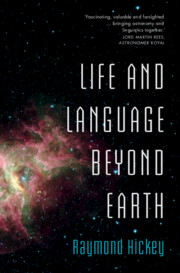Book contents
- Life and Language Beyond Earth
- Reviews
- Life and Language Beyond Earth
- Copyright page
- Contents
- Tables and Figures
- Preface
- How to Use This Book
- Part I Introduction
- Part II The Universe We Live In
- 4 Trying to Grasp Size
- 5 Star Formation and Planets
- 6 The Likelihood of Life
- 7 Possible Conditions on an Exoplanet
- 8 How and Where to Look for Exolife
- 9 The Limits of Exploration
- 10 Assessing Probabilities
- Part III Our Story on Earth
- Part IV The Runaway Brain
- Part V Language, Our Greatest Gift
- Part VI Life and Language, Here and Beyond
- Book part
- Glossary
- Timelines
- Figure credits
- References
- Bibliography
- Index
7 - Possible Conditions on an Exoplanet
from Part II - The Universe We Live In
Published online by Cambridge University Press: 16 September 2023
- Life and Language Beyond Earth
- Reviews
- Life and Language Beyond Earth
- Copyright page
- Contents
- Tables and Figures
- Preface
- How to Use This Book
- Part I Introduction
- Part II The Universe We Live In
- 4 Trying to Grasp Size
- 5 Star Formation and Planets
- 6 The Likelihood of Life
- 7 Possible Conditions on an Exoplanet
- 8 How and Where to Look for Exolife
- 9 The Limits of Exploration
- 10 Assessing Probabilities
- Part III Our Story on Earth
- Part IV The Runaway Brain
- Part V Language, Our Greatest Gift
- Part VI Life and Language, Here and Beyond
- Book part
- Glossary
- Timelines
- Figure credits
- References
- Bibliography
- Index
Summary
The question here is whether the biochemical processes observable on Earth would be replicated on another planet. Take photosynthesis as an example. This is the means by which plants utilise sunlight in the production of adenosine triphosphate (ATP) and glucose as sources of energy. During this process oxygen is given off and carbon dioxide is absorbed, hence the value of photosynthesis for environments on our planet. The actual process is highly complex and involves electrons going through intricate chemical reactions leading at the end to glucose formation. There is also a kind of reverse process, which involves the release of energy through the oxidation of a chemical derived from carbohydrates, fats and proteins. This is known as the citric acid cycle, an essential metabolic pathway used by aerobic organisms.
- Type
- Chapter
- Information
- Life and Language Beyond Earth , pp. 87 - 99Publisher: Cambridge University PressPrint publication year: 2023

